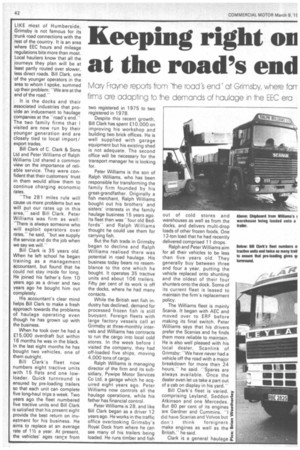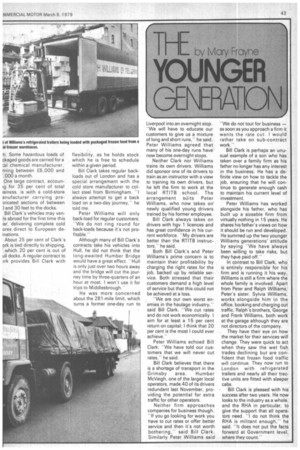Keeping right oil at the road's end
Page 44

Page 45

If you've noticed an error in this article please click here to report it so we can fix it.
Mary Frayne reports from 'the road's end' at Grimsby, where fart firms are adapting to the demands of haulage in the EEC era
LIKE most of Humberside, Grimsby is not famous for its trunk road connections with the rest of the country. It is an area where EEC hours and mileage regulations bite more than most. Local hauliers know that all the journeys they plan will be at least partly routed over slower, less direct roads. Bill Clark, one of the younger operators in the area to whom I spoke, summed up their problem: "We are at the end of the road."
It is the docks and their associated industries that provide an inducement to haulage companies at the -road's end." The two family firms that I visited are now run by their younger generation and are closely tied to local import! export trades.
Bill Clark of C. Clark & Sons Ltd and Peter Williams of Ralph Williams Ltd shared a common view on the importance of reliable service. They were confident that their customers' trust in them would allow them to continue charging economic rates.
"The 281 miles rule will cause us more problems but we will put our rates up in this area," said Bill Clark. Peter Williams was firm as well: "There is always someone who will exploit operators over rates," he said, "but we supply the service and do the job when we say we will."
Bill Clark is 35 years old. When he left school he began training as a management accountant, but found that he could not stay inside for long.
He joined his father's firm 10 years ago as a driver and two years ago he bought him out completely.
His accountant's clear mind helps Bill Clark to make a fresh approach towards the problems of haulage operating even though he has grown up with the business.
When he took over he had a £15,000 overdraft but within 16 months he was in the black. In the last eight months he has bought two vehicles, one of them outright.
Bill Clark's fleet now numbers eight tractive units with 15 flats and one lowloader. Quick turnround is ensured by pre-loading trailers so that each unit can complete five long-haul trips a week. Two years ago the fleet numbered five tractive units and Bill Clark is satisfied that his present eight provide the best return on investment for his business. He aims to replace at an average rate of 11/2 a year. At present, the vehicles' ages ranee from
two registered in 1975 to two registered in 1978.
Despite this recent growth, Bill Clark has spent £10,000 on improving his workshop and building two brick offices. He is well supplied with garage equipment but his existing shed is not adequate. The second office will be necessary for the transport manager he is looking for.
Peter Williams is the son of Ralph Williams, who has been responsible for transforming the family firm founded by his great-grandfather. Originally a fish merchant, Ralph Williams bought out his brothers' and sisters' interests in the family haulage business 15 years ago. Its fleet then was "four old Bedfords'' and Ralph Williams thought he could use them for carrying fish.
But the fish trade in Grimsby began to decline and Ralph Williams realised there was potential in road haulage. His business today bears no resemblance to the one which he bought. It operates 35 tractive units and about 106 trailers. Fifty per cent of its work is off the docks, where he had many contacts.
While the British wet fish industry has declined, demand for processed frozen fish is still buoyant. Foreign fleets with large factory vessels call at Grimsby at three-monthly intervals and Williams has contracts to run the cargo into local cold stores. In the week before I visited the company, they had off-loaded five ships, moving 4,000 tons of cargo.
Ralph Williams is managing director of the firm and its subsidiary, Pywipe Motor Services Co Ltd, a garage which he acquired eight years ago. Peter Williams now controls all the haulage operations, while his father has financial control.
Peter Williams is 28, and like Bill Clark began as a driver 12 years ago. He works in the traffic office overlooking Grimsby's Royal Dock from where he can see many of his trailers being loaded. He runs timber and fish out of cold stores and warehouses as well as from the docks, and delivers multi-drop loads of other frozen foods. One 12-ton load that he had recently delivered comprised 11 drops.
Ralph and Peter Williams aim for all their vehicles to be less than five years old. They generally buy between three and four a year, putting the vehicle replaced onto shunting and the oldest of their four shunters onto the dock. Some of its current fleet is leased to maintain the firm's replacement policy.
The Williams fleet is mainly Scania. It began with AEC and moved over to ERF before making its final switch. Peter Williams says that his drivers prefer the Scanias and he finds them more reliable to maintain. He is also well pleased with his local dealer, Scanlink of Grimsby: "We have never had a vehicle off the road with a major breakdown for more than 24 hours," he said. -Spares are always available. Once the dealer even let us take a part out of a cab on display in his yard.
Bill Clark's fleet is varied, comprising Leyland, Seddon Atkinson and one Mercedes. But 80 per cent of its engines are Gardner and Cummins. "I did have Scanias and Volvos but don't think foreigners make engines as well as the British," he said.
Clark is a general haulage n. Some hazardous loads of ckaged goods are carried for a :al chemical manufacturer, rning between £6,000 and 000 a month.
One large contract, accounig for 35 per cent of total isiness, is with a cold-store anufacturer carrying preDricated sections of between ) and 30 feet to the docks.
Bill Clark's vehicles may venre abroad for the first time this !al-, delivering complete cold ores direct to European denations.
About About 25 per cent of Clark's ork is tied directly to shipping, which 20 per cent is out of ull docks. A regular contract to )rk provides Bill Clark with flexibility, as he holds stock which he is free to schedule within a given period.
Bill Clark takes regular backloads out of London and has a special arrangement with the cold store manufacturer to collect steel from Birmingham. "I always attempt to get a back load on a two-day journey," he told me.
Peter Williams will only back-load for regular customers: 'We do not ring round for back-loads because it's not profitable.'
Although many of Bill Clark's contracts take his vehicles into Hull, he did not think that the long-awaited Humber Bridge would have a great effect. "Hull is only just over two hours away and the bridge will cut the journey time by three-quarters of an hour at most. I won't use it for trips to Middlesbrough:* He was more concerned about the 281-mile limit, which turns a former one-day run to Liverpool into an overnight stop. "We will have to educate our customers to give us a mixture of long and short runs," he said. Peter Williams agreed that many of his one-day runs have now become overnight stops.
Neither Clark nor Williams trains its own drivers. Williams did sponsor one of its drivers to train as an instructor with a view to training its own drivers, but he left the firm to work at the local RTITB school. The arrangement silits Peter Williams, who now takes on' newly qualified young drivers trained by his former employee.
Bill Clark always takes on drivers with hgv 1 licences and has great confidence in his current workforce. "My drivers are better than the RTITB instructors," he said.
Both Bill Clark's and Peter Williams's prime concern is to maintain their profitability by charging the right rates for the job, backed up by reliable service. Both stressed that their customers demand a high level of service but that this could not be achieved at a loss.
"We are our own worst enemies in the haulage industry," said Bill Clark, "We cut rates and do not work economically. I aim for at least a 15 per cent return on capital; I think that 20 per cent is the most I could ever achieve."
Peter Williams echoed Bill Clark: "We have told our customers that we will never cut rates," he said.
Bill Clark believes that there is a shortage of transport in the Grimsby area. Humber McVeigh, one of the larger local operators, made 40 of its drivers redundant last November, providing the potential for extra traffic for other operators.
Neither firm approaches companies for business though, "If you go looking for work you have to cut rates or offer better service and then it's not worth bothering,'" said Bill Clark, Similarly Peter Williams said 'We do not tout for business — as soon as you approach a firm it wants the rate cut. I would rather take on sub-contract work."
Bill Clark is perhaps an unusual example of a son who has taken over a family firm as his father no longer has any interest in the business. He has a definite view on how to tackle the job, ensuring that he will continue to generate enough cash to maintain his current level of investment.
Peter Williams has worked alongside his father, who has built up a sizeable firm from virtually nothing in 15 years. He shares his father's views on how it should be run and developed. He summed up the two younger Williams generations' attitude by saying "We have always been willing to take risks, but they have paid off."
In contrast to Bill Clark, who is entirely responsible for his firm and is running it his way, Williams is still a firm where the whole family is involved. Apart from Peter and Ralph Williams, Peter's sister, Sylvia Williams, works alongside him in the office, booking and charging out traffic. Ralph's brothers, George and Frank Williams, both work at the garage although they are not directors of the company.
They have their eye on how the market for their services will change. They were quick to act when they saw the wet fish trades declining but are confident that frozen food traffic will continue. They now run to London with refrigerated trailers and nearly all their tractive units are fitted with sleeper cabs.
Bill Clark is pleased with his success after two years. He now looks to the industry as a whole, and the RHA in particular, to give the support that all operators need. "I do not think the RHA is militant enough," he said. "It does not put the facts forward at Government level, where they count,"












































































































